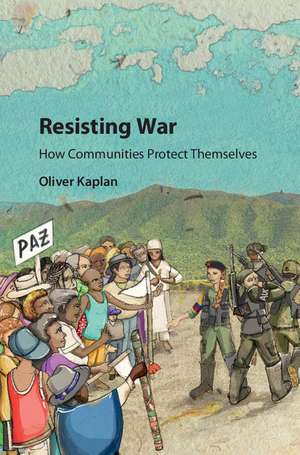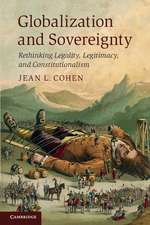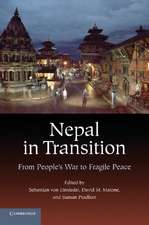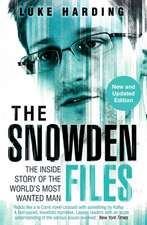Resisting War: How Communities Protect Themselves
Autor Oliver Kaplanen Limba Engleză Hardback – 19 iul 2017
| Toate formatele și edițiile | Preț | Express |
|---|---|---|
| Paperback (1) | 275.47 lei 6-8 săpt. | |
| Cambridge University Press – 18 iul 2018 | 275.47 lei 6-8 săpt. | |
| Hardback (1) | 469.69 lei 3-5 săpt. | +31.29 lei 5-11 zile |
| Cambridge University Press – 19 iul 2017 | 469.69 lei 3-5 săpt. | +31.29 lei 5-11 zile |
Preț: 469.69 lei
Preț vechi: 510.53 lei
-8% Nou
Puncte Express: 705
Preț estimativ în valută:
89.90€ • 97.69$ • 75.57£
89.90€ • 97.69$ • 75.57£
Carte disponibilă
Livrare economică 31 martie-14 aprilie
Livrare express 15-21 martie pentru 41.28 lei
Preluare comenzi: 021 569.72.76
Specificații
ISBN-13: 9781107159808
ISBN-10: 1107159806
Pagini: 376
Ilustrații: 34 b/w illus. 12 maps 21 tables
Dimensiuni: 158 x 235 x 30 mm
Greutate: 0.75 kg
Editura: Cambridge University Press
Colecția Cambridge University Press
Locul publicării:New York, United States
ISBN-10: 1107159806
Pagini: 376
Ilustrații: 34 b/w illus. 12 maps 21 tables
Dimensiuni: 158 x 235 x 30 mm
Greutate: 0.75 kg
Editura: Cambridge University Press
Colecția Cambridge University Press
Locul publicării:New York, United States
Cuprins
1. Introduction: civilian autonomy in civil war; 2. A theory of civilian decision-making in civil war; 3. The history of conflict and local autonomy in Colombia; 4. Living to tell about it: research in conflict settings; 5. How civilian organizations affect civil war violence; 6. Why some communities are more organized than others; 7. The institution of the ATCC: protection through conciliation; 8. Discovering civilian autonomy in Cundinamarca; 9. Civilian autonomy around the world; 10. Conclusions and policy implications.
Recenzii
'We have thousands of books and articles on how armed men threaten unarmed civilians, but very few on the important and fascinating phenomenon of how the civilians protect themselves and fight back. This compelling book fills the gap and represents an important turn in the study of violence, from how it is committed to how it is mitigated.' Steven Pinker, Johnstone Professor of Psychology, Harvard University and author of The Better Angels of Our Nature
'In this path-breaking book Oliver Kaplan shows that in all the narratives about elites, rebels, guerillas, combatants etc. there was somebody missing: society. Patterns of peace and conflict, it turns out, depend on how society mobilizes, organizes, and negotiates. Combining theory, statistical analysis and extraordinary fieldwork in Colombia, Kaplan develops and tests a theory of just how society influences civil war.' James A. Robinson, University of Chicago and author of Why Nations Fail
'In the vast literature on civil wars, we have learned considerably about what motivates rebels to risk their lives to resist state power. In these accounts, civilians living in contested zones are typically portrayed as helpless victims adding only to the counts of collateral damage. Oliver Kaplan, in this brilliantly conceived study, challenges these dominant narratives and recasts peasants as anti-violence entrepreneurs. He discovers the conditions under which small rural communities can draw on their solidarity to avoid devastation from both rebels and the state, and avoid mass exodus to cities. Villagers can negotiate with both sides, Kaplan shows, to save their communities, preserving dignity and life while being protected from nearby death and destruction.' David D. Laitin, Stanford University, California
'The literature on building peace emphasizes the need to include and empower civil society as an antidote to violence and the lack of protection by the state. However, little is known about the conditions under which specific communities mobilize or what goes on under the surface of public protests. Kaplan's rich and colorful accounts of communities in Colombia and the vagaries they face show how they have confronted and appeased different violent actors. Kaplan's book should be required reading for anyone attempting to understand how communities are not only victims but also agents in violent contexts.' Angelika Rettberg, Director of the Master's in Peacebuilding program, Universidad de Los Andes, Colombia
'Kaplan warns U.S. policymakers against counterinsurgency or democracy-promotion strategies that could put the intended beneficiaries at risk by undermining their claims to neutrality.' Richard Feinberg, Foreign Affairs
'Resisting War makes a pioneering contribution to the study of civil conflict and insurgency. Kaplan's book is an exemplary piece of research that provides a captivating and rigorous telling of how civilians in conflict zones protect their own safety.' Dotan A. Haim, Perspectives on Politics
'Kaplan's book will be a cornerstone from which to tackle these questions in the future for a broader and deeper understanding of civilians' lives during civil wars. He should be applauded for asking big, important research questions that resist clean answers. Delving into civil war settings in a thoughtful way to provide rich description of how civilians experience and influence civil wars will form a lasting contribution to our knowledge about civil wars.' Abbey Steele, International Studies Review
'In this path-breaking book Oliver Kaplan shows that in all the narratives about elites, rebels, guerillas, combatants etc. there was somebody missing: society. Patterns of peace and conflict, it turns out, depend on how society mobilizes, organizes, and negotiates. Combining theory, statistical analysis and extraordinary fieldwork in Colombia, Kaplan develops and tests a theory of just how society influences civil war.' James A. Robinson, University of Chicago and author of Why Nations Fail
'In the vast literature on civil wars, we have learned considerably about what motivates rebels to risk their lives to resist state power. In these accounts, civilians living in contested zones are typically portrayed as helpless victims adding only to the counts of collateral damage. Oliver Kaplan, in this brilliantly conceived study, challenges these dominant narratives and recasts peasants as anti-violence entrepreneurs. He discovers the conditions under which small rural communities can draw on their solidarity to avoid devastation from both rebels and the state, and avoid mass exodus to cities. Villagers can negotiate with both sides, Kaplan shows, to save their communities, preserving dignity and life while being protected from nearby death and destruction.' David D. Laitin, Stanford University, California
'The literature on building peace emphasizes the need to include and empower civil society as an antidote to violence and the lack of protection by the state. However, little is known about the conditions under which specific communities mobilize or what goes on under the surface of public protests. Kaplan's rich and colorful accounts of communities in Colombia and the vagaries they face show how they have confronted and appeased different violent actors. Kaplan's book should be required reading for anyone attempting to understand how communities are not only victims but also agents in violent contexts.' Angelika Rettberg, Director of the Master's in Peacebuilding program, Universidad de Los Andes, Colombia
'Kaplan warns U.S. policymakers against counterinsurgency or democracy-promotion strategies that could put the intended beneficiaries at risk by undermining their claims to neutrality.' Richard Feinberg, Foreign Affairs
'Resisting War makes a pioneering contribution to the study of civil conflict and insurgency. Kaplan's book is an exemplary piece of research that provides a captivating and rigorous telling of how civilians in conflict zones protect their own safety.' Dotan A. Haim, Perspectives on Politics
'Kaplan's book will be a cornerstone from which to tackle these questions in the future for a broader and deeper understanding of civilians' lives during civil wars. He should be applauded for asking big, important research questions that resist clean answers. Delving into civil war settings in a thoughtful way to provide rich description of how civilians experience and influence civil wars will form a lasting contribution to our knowledge about civil wars.' Abbey Steele, International Studies Review
Notă biografică
Descriere
This book explores how local social organization and cohesion enable covert and overt nonviolent strategies.












